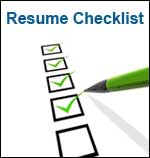s
 A resume represents you to perfection whenever viewed by your recruiter, thus extolling your best virtues and highlighting the smallest of successes. But just like every job you take up and every milestone you achieve, your resume has to change as well and reflect the transformations. We give you effective ways of doing just that.
A resume represents you to perfection whenever viewed by your recruiter, thus extolling your best virtues and highlighting the smallest of successes. But just like every job you take up and every milestone you achieve, your resume has to change as well and reflect the transformations. We give you effective ways of doing just that.
Arti Raghava, director of human resources, Goa Marriott Resort & Spa offers the following tips:
Title the resume as your ‘name' rather than ‘resume;'
Start the resume by highlighting your qualification, key skills and achievements;
If highlighting any achievements, make them specific and quantify wherever possible, like "Incremental revenue of 17 per cent over the target";
Only list job description relevant to the job applied for;
Brag about your achievements but do not exaggerate;
Make a covering letter for your application to go along with your resume;
Add a line at the end; ‘references will be provided upon request' and that will be professional and still save lot of time changing the references often;
Make the responsibilities very specific and concise rather than lengthy explanations of job role.
Swarna Sengupta, HR - head, The Chopras, Overseas Education Consultants gives a breakdown of what is expected depending on the seniority level of the job:
Entry level jobs:
The candidate needs to focus on the educational qualifications, courses pursued, grades obtained, internships done, projects handled, proficiency in foreign languages, involvement in sports and/or extra-curricular activities (debates, dramatics, fine arts, music etc.), contribution to school/college magazines, participation in community work/social causes; and leadership positions held during academic years. These help the prospective employer to know the candidate's personality traits, attitude towards and ability to acquire new skills, aptitude to think out of the box and give solutions to the complex problems and situations.
Middle level jobs:
Employers look for operational skills and your ability to handle the assigned set of responsibilities. Therefore, the resume should include the key responsibilities performed by you. It is a good idea to list down the achievements at the job.
Senior level positions:
The focus of the resume should shift from operational aspects of the job to strategic aspects of the role. Remember, at senior management positions, one is expected to lead and provide strategic direction to a team of middle and junior level employees. The resume should edge out what sets you above the middle level and junior level workforce.
Rajshri Baskaran, HR manager, Cbazaar.in agrees, "The resume should be catchy with only key points, that value add to the job profile of the targeted employer. A long resume would bore the HR and and the process of reading it; they may miss out on the important points." She also suggests not including any photographs.
When it comes to references, updating is of paramount importance. "References should always be given from people one has interacted in recent past say last 1-2 years. An old reference does not carry weight age as the person is being hired because of the relevance of his recent experiences," says Suman Rudra, India HR leader, NCR India. "References are generally required at the last stage of evaluation process so as such not required at the initial interface. At the same time writing too many references can turn against you as you never know one out of the multiple ones might not found favour with the interviewer because of his past experience. References should be provided only after being asked for and should have informed the referee that his name has been given for reference check," advises Vinay Grover, founder and CEO, Symbiosis Management Consultants.
To conclude, keep in mind this clever acronym:
R- Relevant Information to the opening
E- Eloquently written flow & language
S- Specific and quantifiable wherever possible
U- Updated regularly to include achievements/ new roles etc
M- Meaningful to the Job vacancy (Current & Exact)
E- Efficiently crafted & presented